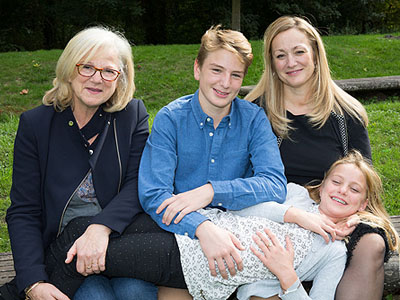-
When Grandparents Become Caregivers: How Family Therapy Can Help
- Posted on May 12, 2021
- by admin
- in All Articles, NFSB Blog
- Comments Off on When Grandparents Become Caregivers: How Family Therapy Can Help
 Did you know one in 10 children in the U.S. live in a household with at least one grandparent? In fact, more than one-third of grandparents (35 percent) who live with a grandchild are the primary caregivers.
Did you know one in 10 children in the U.S. live in a household with at least one grandparent? In fact, more than one-third of grandparents (35 percent) who live with a grandchild are the primary caregivers.Grandparents are more relied upon today as caregivers than in previous generations. This can happen for a variety of reasons, including but not limited to:
- Both parents working
- Substance use disorder
- Mental health disorder
- Financial hardship/job loss
- Inexperienced parent (teen pregnancy)
- Divorce Death of a parent
- Domestic abuse
- Military service
Although grandparents typically enjoy being with their grandchildren and often feel a greater sense of purpose as a caregiver, this can create significant stress. Perhaps they’re dealing with their own health and aging issues or had been approaching retirement with certain plans in mind. They can go through what is essentially a grieving period to process an unexpected change.
In a multi-generational household, who becomes the main parent figure? When children spend so much time with grandparents, family therapy is often needed to ensure each family member is filling the appropriate role. When grandparents are caregivers, children essentially have a second level of parents from whom to separate. This can make it more difficult for the child to become independent.
Ultimately, when grandparents step up to fill an important need as caregivers, different members of the family will be affected in different ways. The most important thing to remember is that help and support are available. Family therapy can help you see the full picture from each family member’s perspective.
The sooner you seek help, the better prepared you’ll be to navigate this change, which can create a healthier, less stressful environment for all involved.
An NFSB Success Story
When we first started seeing the Smith family, John was 9 years old. His grandparents made the decision to become John’s caregiver because his mother had struggled with alcohol use disorder for most of her adult life.
“There were several issues that the grandparents had to work through as they adjusted to their decision,” said Joe Armentano, MSW (Master of Social Work), LCSW (Licensed Clinical Social Worker), and Coordinator of Education and Staff Development at Nutley Family Service Bureau (NFSB). “The grandmother had health issues, the grandfather had to continue working in his 70s to make it work financially, and they were both stressed and frustrated about their daughter’s addiction.”
John had been seemingly scapegoated for his mother’s struggles and was over-medicated by a psychiatrist outside of NFSB. He was dealing with his own social issues and never knew his biological father.
“The grandmother was well-intentioned but would often hover over John,” Joe said. “She was over-involved and created somewhat of an adversarial relationship with John’s school. In family therapy, we worked to develop a healthier parenting system that worked for everyone while collaborating closely with John’s school counselor.”
Because John had behavioral issues and social anxieties that were causing him to get in trouble in school, virtual learning during the pandemic was beneficial. This reduced the amount of negative attention and allowed John to work through his own challenges.
“When substance use disorders impact a family, communication is often unhealthy,” Joe said. “John is such a great kid with a big heart and strong moral compass. We worked with him to express his feelings and connected him with family activities and volunteering opportunities through a local church group.”
Family therapy, along with ongoing communication with doctors and the school counselor, resulted in tremendous improvement for John. When he stopped taking medication that had been previously prescribed, his demeanor and personality changed significantly.
The grandparents, who continued to devote their love and energy to John, received counseling as well. They learned to trust and work with the school for John’s benefit and gained a better understanding of how to fill the role of parents in a more productive way.
“Self-care is extremely important,” Joe said. “As caregivers, grandparents can be so focused on the well-being of their grandchildren that they neglect themselves. Because of the stigma and fear that often surround mental health, many people who are struggling don’t ask for help. I’m glad they had the courage to reach out to us for support.”
The family has gone through its share of growing pains during this period of change, but they’re in a much better place today. Family therapy provided the foundation for healing, progress, and growth as the grandparents adjusted to their role as primary caregivers and John worked through his difficulties.
If your family is going through changes that involve grandparents playing a larger role in caring for a child, it’s okay to seek support. Please contact us today at 973-667-1884 to find out what resources are available.
If you enjoyed this article please consider sharing it!

















